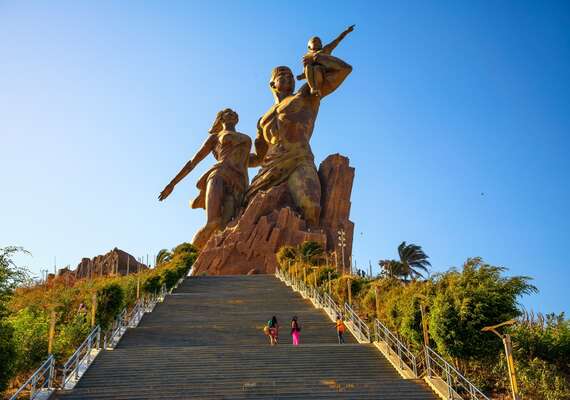Dakar City Guide

| Country: | Senegal |
| Known Names: | |
| Language: | French |
| Population: | Approx. 1.1 million |
| Religion: | Islam (most common) |
| Area Code: | +221 |
| Currency: | West African CFA franc (XOF) |
| Time Zone: | Greenwich Mean Time (GMT) - UTC/GMT +0 hours |
| Visa: | |
| Consulate: |
General Information / Guide
Dakar, the vibrant capital of Senegal, sits on the tip of the African continent. Known for its lively street markets, French colonial heritage, and bustling arts scene, Dakar offers a dynamic blend of African culture and urban sophistication.
Climate / Weather / When to Go
Dakar experiences a mild, dry climate with two main seasons: a dry season from November to May and a rainy season from June to October. The best time to visit is during the dry season when the weather is warm and comfortable.
How to Get There
Dakar's Blaise Diagne International Airport is the main gateway, with flights to and from various international destinations. The city is also a port of call for many cruise ships, adding to its accessibility.
Food / Restaurants / What to Eat and Drink
Dakar’s culinary scene features an array of Senegalese specialties, such as Thieboudienne (fish and rice), Yassa (marinated meat), and Senegalese tea. Seafood is exceptionally fresh and widely available. The Plateau and Ngor areas are known for their diverse dining options, ranging from traditional Senegalese eateries to international restaurants.
Important Places / Places to Visit
- Gorée Island: A UNESCO World Heritage site, known for its role in the trans-Atlantic slave trade, with preserved colonial architecture and the House of Slaves museum.
- African Renaissance Monument: Standing taller than the Statue of Liberty, this monument symbolizes Africa's progress and future aspirations.
- Lake Retba (Lac Rose): Famous for its pink-colored waters due to the presence of Dunaliella salina algae, offering a unique natural spectacle and salt harvesting sites.
- IFAN Museum of African Arts: One of the oldest art museums in West Africa, showcasing a wide range of African art, including masks, musical instruments, and textiles.
- Ngor Island: A serene escape from the city, known for its beautiful beaches, surf spots, and relaxed atmosphere, accessible by a short boat ride from Dakar.
- Sandaga Market: The largest and most vibrant market in Dakar, where you can find everything from fresh produce to textiles and handicrafts.
What to Do
Dakar, a city of vibrant cultures and landscapes, invites exploration and adventure. Take a day trip to Gorée Island to learn about its poignant history and enjoy the colorful colonial architecture. Wander through the bustling markets of Sandaga or Soumbédioune, where you can find everything from traditional fabrics to handcrafted jewelry. Enjoy the city's lively music scene with Mbalax, the soul of Senegal's music, permeating through the streets and nightclubs. Don't miss the chance to surf or relax at one of Dakar's beautiful beaches, such as Ngor or Yoff. Dakar's rich history, combined with its contemporary arts and lively atmosphere, offers a dynamic experience for all visitors.
Nightlife / Bars / Entertainment
Dakar stands out with its electrifying nightlife that pulses with rhythms of Mbalax, the country's popular music genre. The city is dotted with a variety of nightclubs and bars, especially in the Ngor, Almadies, and the downtown Plateau areas, where locals and tourists dance till dawn. Live music is a staple in Dakar's nightlife, with venues like Just 4 U and Le Viking hosting renowned local and international artists. For a more relaxed evening, many beachside bars in Dakar offer a serene setting to enjoy a drink while listening to the waves. The blend of traditional Senegalese music, international beats, and the city's welcoming atmosphere makes Dakar's nightlife uniquely vibrant and inclusive.
Shopping / What to Buy
Dakar, the vibrant capital of Senegal, is a treasure trove for shoppers looking for African art, textiles, and handicrafts. The Marché Sandaga is the most iconic market, offering a wide range of goods including colorful fabrics, traditional clothing, and local artwork. For a more curated selection of art and crafts, the Village des Arts is a collective of artist studios and galleries. Dakar is also famous for its leather goods, available at the Marché HLM, where shoppers can find beautifully crafted bags, belts, and wallets. Don't miss the opportunity to buy Senegalese gold jewelry, known for its quality and craftsmanship.
Festivals/ Events
January/February: Festival International de Théâtre et de Marionnettes de Ouagadougou (FITMO)
May/June: Dak'Art Biennale
November: Salon International de l'Artisanat de Dakar (SIAD)
Holidays / Festivals / Important Days
1 January: New Year's Day
1 May: Labour Day
(Varies): Ascension Day
(Varies): Korité (Eid al-Fitr)
(Varies): Whit Monday
(Varies): Tabaski (Eid al-Adha)
25 December: Christmas Day
Things to Pay Attention to / Important Information
French is the official language; Wolof is also widely spoken. English may not be widely understood.
Be vigilant of personal belongings in crowded places due to pickpocketing risks.
Negotiate taxi and auto rickshaw fares in advance to avoid overcharges.
Enjoy the city's vibrant music scene but be mindful of noise levels in residential areas.
Transportation
Dakar's travel options include public buses, running early morning to late evening, with fares from XOF 150 to 500, and local buses at XOF 50 to 150 for short trips. Day-long guided tours are available. Auto rickshaws, cheap but meterless, require fare negotiation. Taxis, safer and more comfortable, start at XOF 500 plus XOF 200 per km, available at transport hubs and via apps.
